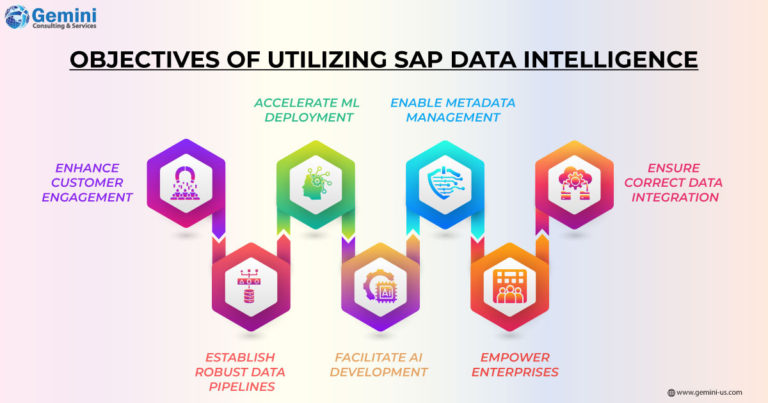Enterprises grappling with data complexities can find a solution in SAP Data Intelligence. This solution empowers businesses to orchestrate distributed data seamlessly while leveraging existing code and distributed processing engines.
At its core, SAP Data Intelligence is a tool for data management, orchestration, monitoring, and the implementation of AI and Machine Learning (ML) applications. Its primary function is to ingest enterprise data and derive actionable insights.
Key Capabilities and Objectives
SAP Data Intelligence uses traditional Extract, Transform, and Load (ETL) tools with advanced machine learning capabilities. The solution in fact, bridges the gap between disparate data sources, including big data, machine data, social data, IoT, and SAP S/4HANA, fostering a more cohesive and integrated data ecosystem.
Acting as a critical data management and orchestration layer within the SAP Business Technology Platform (BTP), it transforms distributed data into valuable insights. Its innovative approach facilitates organizational scaling, ensuring that businesses can extract maximum value from their data assets.
SAP Data Intelligence also offers a comprehensive suite of functionalities, including data processing, data flow management, and data integration, thereby enabling businesses to streamline their data operations and drive informed decision-making processes.
The capabilities of SAP Data Intelligence encompass the following.
- Modular data pipelines that enable access to essential data operations from ingestion to sharing.
- Browser-based interface serving as a central hub for data orchestration, covering modeling, deployment, monitoring, task automation, processing, and management.
- Pre-built operators for direct use or customization within pipelines.
- Integration and orchestration of open-source frameworks like TensorFlow, R, or Python with SAP frameworks such as PAL/APL in SAP HANA.

- Enhancing customer engagement through intelligent data-driven actions powered by machine learning.
- Establishing robust data pipelines for stream handling, preparation, transformations, and complex processing.
- Accelerating the deployment of machine learning scenarios with unified management and support for various user roles.
- Facilitating AI development and deployment through enhanced developer and data science experiences, rapid environment provisioning, and versatile landscape management.
- Enabling comprehensive metadata management for understanding business data, including rules, lineage, glossary, and dashboard functionalities for alignment across teams.
- Empowering enterprises to create and deploy ML models effectively.
- Ensuring correct data integration and orchestration across SAP and non-SAP sources, including third-party media, IoT, cloud services, and business processes.
Earlier, SAP provided SAP Data Hub to address data management challenges, albeit with limitations. However, with the introduction of SAP BTP Data Intelligence, these shortcomings have been mitigated to a significant extent.
SAP Data Intelligence offers secure data management and utilization. It is adaptable to various deployment environments, including hyperscalers, on-premise data centers, and private clouds, under a Bring Your Own License (BYOL) model. However, the efficacy may vary depending on the deployment context.
Partner with Gemini Consulting & Services to integrate SAP DI today to revolutionize your workflows and achieve unparalleled efficiency. Contact us to know how incorporating SAP Data Intelligence into your business model can significantly enhance audience profiling and business agility.
The Framework of SAP Data Intelligence
The architecture of SAP Data Intelligence typically relies on four foundational pillars.

- Data Integration
Within your organization, there may be a need to integrate diverse data types across systems, possibly including a data lake. As a result, on-the-fly data transformation becomes essential. This integration may necessitate the utilization of on-premise legacy processing engines, cloud-processing engines, or open-source engines.
Support for these requirements is generally facilitated through capabilities such as connectivity to both SAP and non-SAP systems. This functionality empowers users to create, modify, monitor, and manage connections and data alterations seamlessly.
- Streaming
By integrating Kafka Consumer and Kafka Producer operators, along with stream processing services and a storage layer, SAP DI facilitates the rapid and effective deployment of a messaging system and its utilization. By incorporating a Kafka service within SAP Data Intelligence, connectivity is enabled through Connection Management. This feature empowers users to leverage consumer and producer operators within the SAP DI Modeler, facilitating the orchestration of data flow.
- Governance
The Metadata Explorer enables users to discover, and profile consumed data, identifying recurring business rules and potential anomalies. This may necessitate the transmission of high-quality data downstream from BTP Data Intelligence. In addition, a spreadsheet-based UI and metadata crawlers can be utilized to classify, explore, and label data assets across the connected landscape. Other features, such as data lineage enables users to review data transformation history and associated metadata, including any alterations made over time.
- Orchestration
Acting as a comprehensive data management solution, SAP Data Intelligence (DI) provides a cohesive perspective on accessible data to enhance processing and integration efficiency. This platform simplifies the creation of sturdy data pipelines by utilizing open-source components for enhanced reusability. Additionally, SAP DI facilitates centralized distributed information management, granting insight into diverse pipelines and data origins across the environment. Furthermore, it offers monitoring capabilities for machine-learning-driven pipelines, assisting users in identifying appropriate models for deployment.
SAP Data Intelligence Features
SAP Data Intelligence (DI) offers a comprehensive set of features designed to empower businesses with data-driven decision-making capabilities. Currently, there are four key features available in SAP DI. They are given below.
Data Integration: SAP DI seamlessly connect with various data sources and facilitates gaining insights to support informed decision-making and enable intelligent processes.
Enterprise Data Management: SAP DI enables the transformation of unstructured, structured, and streaming data into valuable business insights, facilitating faster and better decision-making. Additionally, this feature supports:
Machine Learning: Leveraging machine learning capabilities, SAP DI enables rapid system innovation, enhances overall business value, and improves operational efficiency.
Data Catalog: SAP DI offers a cutting-edge data management feature that facilitates understanding and validation of incoming data, ensuring its suitability for use.



